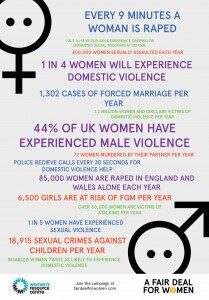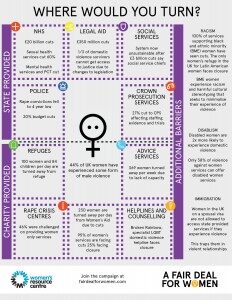
****Vital updates to this page coming soon! Look out for ‘Fair Deal for Women Report – Part 2: Women Speak Out on Safety Justice and support and Women’s Health’****
Levels of violence against women and girls remain extremely high with 44% of women experiencing male violence in their lifetime. 1.2 million women experience domestic violence every year, and one woman is raped every 9 minutes in the UK. 6,500 girls are at risk of female genital mutilation and there were 1,300 known cases of forced marriage in 2013, 15% were girls under the age of 15.
 Click here for full sized infographic
Click here for full sized infographic
Sources
1 in 4 UK women experience domestic violence during their lifetimes (although experts predict figures even higher than this) and on average more than 2 women are killed by violent (ex) partners each week. Disabled women and women with long term health conditions make up 1/3 of all women in refuges in the UK. There is evidence that disabled women experience higher rates of violence, and that access to support services are problematic, with a lack of specialist help for disabled women.
These statistics are shocking and demonstrate how ingrained male violence against women is in our culture.
Financial abuse
“Financial abuse includes control over money, exploitation of the survivor’s assets and sabotage of survivor’s efforts to work, study or interact with others.” says Women’s Aid
The rolling out of Universal Credit in replacement of other types of welfare places women at risk of financial abuse, especially disabled women. Disabled women are particularly at risk of abuse from partners, other family members, or carers because they are disabled and might have additional benefit entitlement.
Where would you turn?
If domestic or sexual violence happened to you, where would you go? The initial places might be the police, the hospital, or social services. However…
- only 6% of rapes are actually prosecuted
- the NHS has undergone £20billion in cuts
- the current care system is “unsustainable” after £3billion in cuts
Often these services cannot help women, and so women’s charities provide a safety net of refuges, rape crisis centres, counselling services, helplines, and advice services. However…
- 95% of women’s charities are experiencing cuts
- 100 women and 84 children are turned away from refuge every day
- 100% of charities that support Black and ethnic minority women are facing cuts
- 25% of women’s organisations are facing closure
What Women’s Charities do to address these issues
- Rape Crisis Centres receive 32,600 women every year
- At least 82,500 women use outreach services every year
- At least 9,500 women use refuge services every year
- Women’s organisations lobby the Government to make change on behalf of the women they serve and challenge discriminatory decision making
- Organisations for Black and ethnic minority women and girls focus on complex issues of violence, including so-called ‘honour based’ violence, female genital mutilation, and the difficulties experienced by women facing violence and have no recourse to public funds.
 Click here for the full sized infographic
Click here for the full sized infographic
Sources
This is when women comes into the country with a spouse or partner, and they are tied to a spousal visa. The spousal visa means that it is their partner, not them, with rights in this country. Therefore, if a woman experiences violence, she cannot get help from the police, the NHS. These women are trapped in violent relationships.
Southall Black Sisters estimates that 600-1000 women in this situation face violence from their spouses or partner each year. Women’s Aid found that in one year refuges had to turn away 389 women because they had no recourse to public funds.
What can Parliament do?
- Pledge ring fenced funding for women’s charities that support women who need help
- Create a national strategy to tackle violence against women and girls
- Establish a specific strategy to sustain specialist services for Black and ethnic minority women, who find it hard to access services because of the racism and cultural discrimination they face
- Establish a specific strategy to create and sustain specialist services for disabled women for whom generic women’s services do not always work, or indeed exclude
Sources
Share on FacebookShare on Twitter
